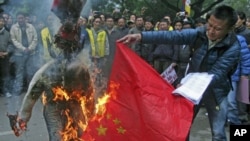Increasing violence between Chinese security forces and Tibetan protesters is raising alarm, just weeks before China's vice president is scheduled to visit the United States. The Tibetan exile administration based in India is calling for international intervention.
The United States says it is "gravely concerned" about reports of violence against Tibetans in China's Sichuan province. A Tibetan activist group says two more Tibetan protesters were killed Wednesday when security forces fired into a crowd, raising this week's death toll to at least four. Dozens of others were reportedly wounded.
Official Chinese media confirmed one killing Wednesday, saying security forces had no choice but to use force against "rioters" who threatened them.
In Dharamsala, the northern Indian town that has been the de facto capital of Tibetan exiles for more than half a century, Tibetan Buddhist monks offered prayers for those killed.
The memorial was organized by the Tibetan exile administration, which is hosted by India and led by Lobsang Sangay, the Tibetan government in exile's recently-inaugurated prime minister. Lobsang is urging the international community to pressure China to stop the violence.
At least 16 Tibetans have burned themselves to death over the past year to protest what they see as a systematic campaign to eradicate their traditional Buddhist culture and the flood of Chinese into areas of Tibet controlled by Beijing.
Karma Choephel is a former speaker of the Tibetan parliament in exile.
"We have been all the time saying that because of the oppressive policies of the Chinese government on the Tibetan people, where the people are discriminated very much from the Han Chinese and the local Tibetan people, so, people are very much dissatisfied with the policies and therefore, this is going on," said Choephel.
Protesters in and out of Tibet are demanding that China grant the region autonomy and permit the return of the Dalai Lama, the Tibetan spiritual leader. The Dalai Lama crossed into India in 1959 after a failed uprising against Chinese military rule, and he was followed by tens of thousands of supporters. China views him as a separatist leader, and refers to Tibetans who have self-immolated in protest as "terrorists."
Chinese Vice President Xi Jinping, who is widely expected to take over China's leadership later this year, is due to visit Washington next month. U.S. officials say they will convey their concerns about Beijing's policies in Tibet.
Tibet Exiles Express Concern Over China's Killing of Protesters
- By Kurt Achin




